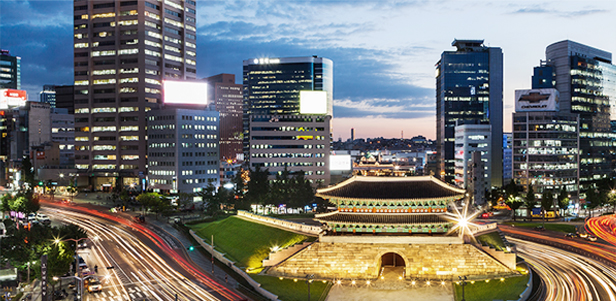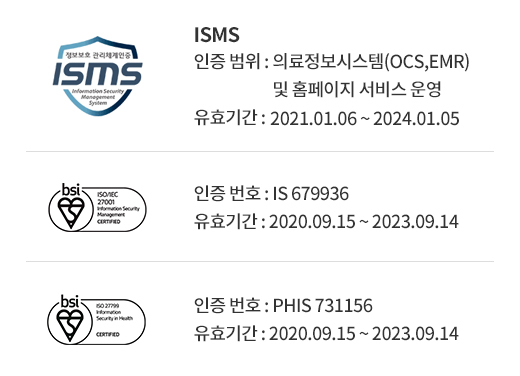General Guide
If you plan to travel to South Korea for medical treatment, you and your companions need to exercise a few precautions to stay safe and healthy during the visit.
Political Environment
South Korea is constitutional democracy with the framework of a presidential representative democratic republic, and domestic political situation is very stable. It is important to mention that South Korea has geopolitical risk mostly coming from the relationship with North Korea. However, it does not affect daily lives of Korean people. In addition, tension between two countries are reduced recently through inter-Korea summit.

Safety and Security
The Republic of Korea (South Korea) is generally considered as one of the safest
countries in the world by many tourists. It is safe to walk in the streets any time of
the day in major cities. South Korea successfully held Seoul Olympics,
2002 World Cup, and most recently PyeongChang Winter Olympics which once again demonstrated safe environment. You will notice that policemen are kind and always
willing to help.
Follow basic safety rules, and when you need help, go to the nearest police station or dial 112. Following link will provide you with more detailed information.
http://english.visitseoul.net/essential-Info-article/Safety_/12376
For lost and found, this link would also be helpful.
http://english.visitseoul.net/essential-Info-article/Lost-and-Found_/12403
South Korea has very good public transportation system;
local buses, regional buses, subways, and trains are well-connected, safe, and clean. Buses and subways operate late hours as well. Taxi and shared vehicles are also available. http://english.visitseoul.net/essential-Info-article/Getting-Around_/211
countries in the world by many tourists. It is safe to walk in the streets any time of
the day in major cities. South Korea successfully held Seoul Olympics,
2002 World Cup, and most recently PyeongChang Winter Olympics which once again demonstrated safe environment. You will notice that policemen are kind and always
willing to help.
Follow basic safety rules, and when you need help, go to the nearest police station or dial 112. Following link will provide you with more detailed information.
http://english.visitseoul.net/essential-Info-article/Safety_/12376
For lost and found, this link would also be helpful.
http://english.visitseoul.net/essential-Info-article/Lost-and-Found_/12403
South Korea has very good public transportation system;
local buses, regional buses, subways, and trains are well-connected, safe, and clean. Buses and subways operate late hours as well. Taxi and shared vehicles are also available. http://english.visitseoul.net/essential-Info-article/Getting-Around_/211
Health and Vaccinations
South Korea is an industrialized country with high level of public hygiene. Food and water standards in South Korea are one of the best in the world. General precautions such hand washing after outdoor activity and avoiding bug bites are recommended. For patient who are vulnerable to infectious disease, below cautions provided by Centers for Disease Control and Prevention (the United States) may be helpful for traveling South Korea.
https://wwwnc.cdc.gov/travel/destinations/traveler/none/south-korea
There is no mandatory vaccination required to enter South Korea. Centers for Disease Control Korea provides weekly report for domestic infectious disease occurrence.
http://kdca.go.kr/board/board.es?mid=a30502000000&bid=0032
We advise for you to have travelers’ health insurance and/or additional insurance for unexpected complications during the course of treatment. In case of medical emergencies, you can contact our center, or get help from 119 service.
https://wwwnc.cdc.gov/travel/destinations/traveler/none/south-korea
There is no mandatory vaccination required to enter South Korea. Centers for Disease Control Korea provides weekly report for domestic infectious disease occurrence.
http://kdca.go.kr/board/board.es?mid=a30502000000&bid=0032
We advise for you to have travelers’ health insurance and/or additional insurance for unexpected complications during the course of treatment. In case of medical emergencies, you can contact our center, or get help from 119 service.
| SNUBH International Healthcare Center | 119 service |
|---|---|
| +82-10-3049-2038 (English) | Dial 119 from anywhere in Korea, and your location will be automatically identified. (Available in 16 languages) |
| +82-10-9722-2034 (Russian) | |
| +82-10-3018-2037 (Arabic) |
VISA
Foreign nationals entering Korea are required to have a valid passport and a Korean VISA issued by the Korean
embassy or consular offices in their country. However, citizens from many countries are now permitted VISA-free entry
for a limited period under certain conditions. In order to check whether you are allowed to enter Korea without VISA
issuance and for other requirements, please contact a Korean Embassy or Consulate in your country or visit the following websites to confirm.
embassy or consular offices in their country. However, citizens from many countries are now permitted VISA-free entry
for a limited period under certain conditions. In order to check whether you are allowed to enter Korea without VISA
issuance and for other requirements, please contact a Korean Embassy or Consulate in your country or visit the following websites to confirm.
| VISA information | Korea Immigration Service | Hi Korea |
|---|---|---|
| Ministry of Foreign Affairs www.mofa.go.kr(Korean, English) |
www.immigration.go.kr (Korean, English) |
www.hikorea.go.kr (Korean, English, Chinese) |
| VISA information | Ministry of Foreign Affairs www.mofa.go.kr(Korean, English) |
|---|---|
| Korea Immigration Service | www.immigration.go.kr (Korean, English) |
| Hi Korea | www.hikorea.go.kr (Korean, English, Chinese) |






